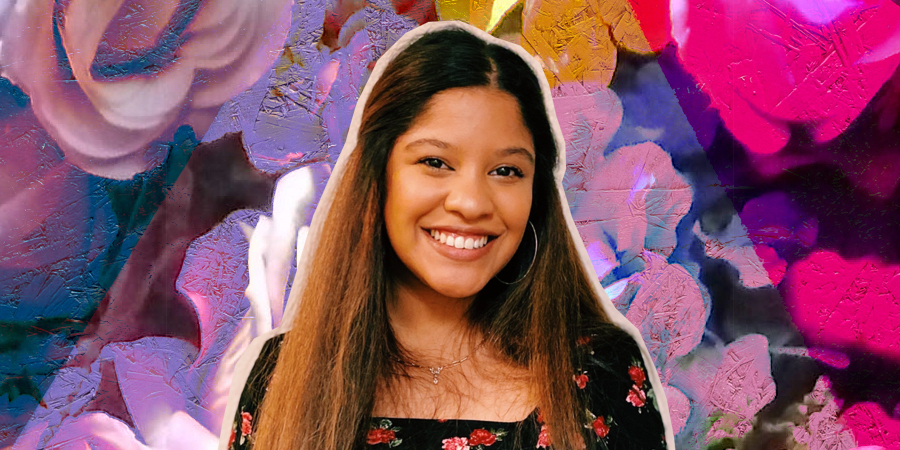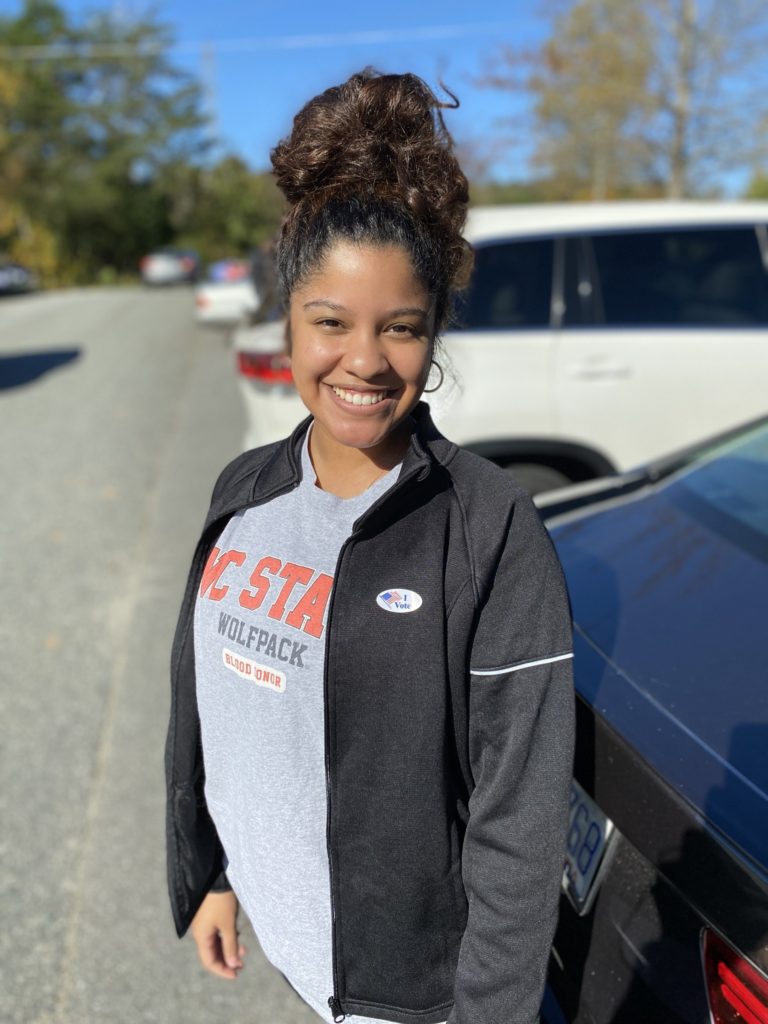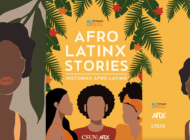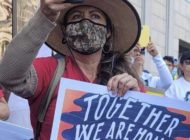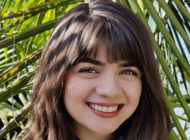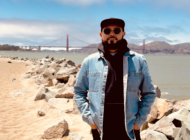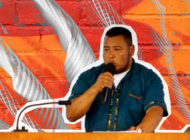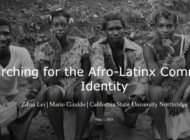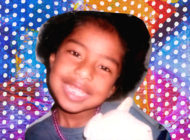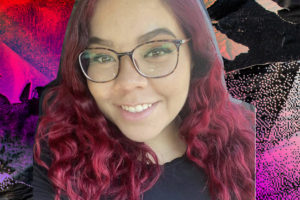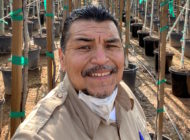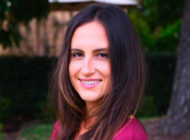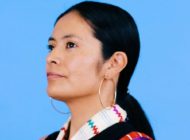In this episode, Kimberly Linares talks to Yannell Serrano, a student from North Carolina State University, about her childhood experiences and the discrimination she’s received because of the color of her skin and her social economic background.
By KIMBERLY LINARES
EL NUEVO SOL
Kimberly Linares: Welcome to Radio Nepantla, a podcast from El Nuevo Sol, the multimedia site for the Spanish- language journalism program at Cal State University Northridge. My name is Kimberly Linares.
The title of this series is Afro-Latinx. We want to tell here diverse stories of Afro-Latinx, Black-Latinx, and Afro-Latin American identity.
According to the Pew Hispanic Center, one out of every four Latinos in the nation identify as Afro-Latinx. This is the same proportion of Afro-Latin Americans in that region.
We decided to use the term Afro-Latinx—with X—to be inclusive of non-binary people. The umbrella term “Black-Latinx” refers to biracial people with one African-American and one Latinx parent. The umbrella term “Afro-Latin American” refers to people of African ancestry in Latin America.
Kimberly Linares: In this episode, I interviewed Yannell Serrano, a student from North Carolina State University. Through our discussion we talked about her childhood experiences and the discrimination she’s received because of the color of her skin and her social economic background.
Kimberly Linares: Yannell was born in Miami, Florida and lived there until the age of 6. She moved to a small town in North Carolina called Kernersville and currently still resides there.
Yannell Serrano: Kernersville is a predominantly White town. So, like you did have Hispanics and Latinos and you also had Black people but it was more predominantly White. So whenever I first moved here, you know just coming from Miami—Miami is more of a melting pot of everything. You see people from all ethnicities and nationalities and race coming here where everything was just—I don’t even know how to describe it.
Kimberly Linares: In terms of inclusivity she found it difficult to find people that she could relate to.
Yannell Serrano: I did have a friend that I grew up with in Florida that also moved to the same town as I did so it was nice because we had each other for a good while. You know, it was just people didn’t understand or—even with the Hispanic population here. We’re from the Carribean and they’re from Central America so there were differences there that they didn’t quite understand.
Kimberly Linares: She did not let any differences or remarks interfere or push her away from any of the things that interest her the most.
Yannell Serrano: I’ve never really fit in with like any type of group, I was always just kind of like there. I guess it’s like I never really related to one group more over the other.
Kimberly Linares: Yannell’s father was born in Indiana but grew up in Puerto Rico and her mother was born in Massachusetts but is Dominican.
Kimberly Linares: Living in a town where people don’t necessarily understand who she is resulted in acts of discrimination.
Yannell Serrano: My family and I would get stared at a lot at restaurants that we would go out to eat—shopping at Walmart for groceries. For instance, my father one time grocery shopping with my mom, actually, a lady—so like when you are leaving Walmart they ask you for your receipt. And the lady looked at my dad and was like recibo, recibo. Instead of just saying like, can I look at your receipt?
Yannell Serrano: For me personally, there was an instance in high school where I would say it was more condescending—more like a microaggression. I was on the tennis team and one of the mothers would regularly come out. And it was around the time that everyone was getting their license and their cars and everything. Kernersville does have a lot of White people that come from money, or have money, and, you know, my parents and my family, we don’t come from money. We don’t have a lot of money—like, my parents work. We’re a working family. And so the time was rolling around and I already knew, like I wasn’t going to be able to get my car at the age of 16, 17—when everybody gets theirs. Because we have to be on insurance and insurance is expensive—it’s not cheap. I did not have a job at that time because my parents didn’t want me working just yet, and they wanted me to focus on school. So I didn’t have a way to help them out with that either. So I was just like it’s whatever—I can wait a couple years, there is still the bus. This is not an issue for me but the mom kept asking me like, “oh, when are you going to get your car, when are you going to get your license.” And I told her, “oh, you know I’m not ready for that yet. I’ll probably get it in a couple of years.” She looked at me and she was like, “why because your family can’t afford it?”
Kimberly Linares: The Growth and Development trends provided by the City of Greensboro show that North Carolina contains the sixth largest African-American population and the eleventh largest Hispanic population in the U.S.
Kimberly Linares: Despite the growing population of both African-Americans and Latinos, full representation of Afro-Latinos is almost nonexistent in North Carolina. After experiencing discrimination Yannell confided in her mother, as she could not process the hateful comments of a White woman.
Yannell Serrano: My mom has always told me to like stand my ground, she’s like if anything like this ever happens again, “you stand up for yourself and you tell her what’s up.” So in that type of sense like my family has been very open about things like that, that happen. What you should do; what you should say. As—regarding to how I felt about the situation and how that’s impacted me, I can say that I am very lucky that I have a family that is very communicative and very open minded and we talk about our feelings and we talk about these things. It is not something that gets swept under the rug.
Kimberly Linares: Yannell has a total of 4 sisters, two of which are twins who have also experienced racial discrimination.
Yannell Serrano: They were in middle school. I want to say seventh grade, so they were like 12, maybe 13 years old. And with them—so they are lighter skinned, but you know they have curvy bodies, they have curly hair. So when they came over here people were like “what are you? What are you? You’re mixed.” “No—we’re Dominican.” But people here don’t really know ethnicities and stuff like that. I feel like people here aren’t really educated on that… One story that comes to mind was in middle school, was that I want to say they had some issues with some, a group of girls. There was just one specific girl, that I believe that she was Black and basically like they’re twins. There weren’t really any twins here. I don’t really remember the situation too much but from what I remember pretty much the girl was just kind of like bullying them, going after them. A remark that she made was because “you guys are new and you think that you are exotic you think that you are better than me.”
Kimberly Linares: Yannell’s mixed identity is made present in the dishes cooked at home. She remembers with ease what foods marked her childhood years.
Yannell Serrano: We would mainly eat rice, beans and some type of meat and with that a—like a morro, which is rice and beans mixed together. Plantains was in our diet a lot, like we would make mangu or platanos maduros. Avocados—not the avocados like the small ones, they are really big. I forget what type of avocado they are but it’s one known to be found in the Caribbean. Mangu was definitely a big one. Rabo, which is oxtail, that was stuff that we would eat, too. Dessert-wise we would have a little bit of everything. My sister is a baker so she would experiment with stuff like flan, tres lecheS. Oh my god, there is a drink I’m not a big fan of it but my family loves it, it’s called morisonando and it kind of reminds me—I don’t know if you’ve ever had like the orange creamsicle popsicle, that’s kind of what it reminds me of because it’s orange juice and heavy whipping cream. Don’t count me on that because I’ve never made it before but my family does make it.
Kimberly Linares: Music isn’t set to one genre in the Serrano family as they listen to pretty much everything. Reggaeton, bachata, salsa and dembow make part of Latin America’s lively music environment.
Yannell Serrano: We would listen to like old bachatas, old merengues, salsa music, reggaeton. I would say that mainly fills our household and continues to fill our household. Very rarely—we’ll have days where we are like “oh, yeah old eighties music” or something like American music.
Kimberly Linares: English is her first language, and is considered bilingual as she grew up speaking both Spanish and English.
Yannell Serrano: Mainly, honestly we would speak Spanglish, if you listen to any of the conversations we’re having it’s like we start with one and we end with the other. But no, I did not learn English at school. I took Spanish classes because a foreign language was a requirement but when we moved here they actually wanted to put me and my sisters in ESL because they just assumed since we were Latino that we didn’t know how to speak English. But, we speak English very well so my mom was able to get us out of.
Kimberly Linares: Yannell has had the chance to connect with her family here in the states. When she lived in Florida her father’s side of the family lived there as well so she had the blessing of growing up with her cousins. Her mother’s side of the family still resides in Massachusetts.
Yannell Serrano: Since we are in North Carolina, we’re literally right smack in the middle of both places. So we would take trips to go visit my mom’s family or my dad’s, but my dad’s family started to move to North Carolina. So we have them here closer which is nice, so now we get to visit my mom’s side of the family more frequently.
Kimberly Linares: She has not had the opportunity to visit Puerto Rico or the Dominican Republic.
Yannell Serrano: I have not but I am dying to go. I actually think that we are planning on going to the Dominican Republic in a couple of years because my mom wants us to experience that. She still has some family over there so we’re hoping that we will be able to go and visit and eat really good food. As for Puerto Rico, I do know that we also want to plan a visit there sometime in the future.
Kimberly Linares: Hair and its meaning in the Dominican Republic and Puerto Rico is of importance as it is a big part of their culture and identity.
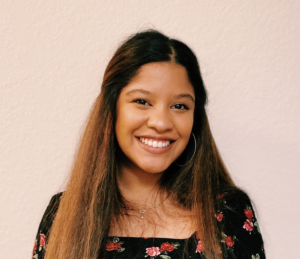 Yannell Serrano: My hair has changed a lot. When I was very little my hair was more wavy kind of straight but it was more on the wavier side. It was until that I went through puberty that my hair got really curly and then my sisters and my mom would do relaxing treatments for their hair. So their curls were a little more softer and looser, to make their hair more manageable. I never used that type of treatment in my hair but through my teenage years, pre-teen years like middle school, end of elementary school, going into middle school and into high school I straightened my hair like every week. So for me having curly hair at that age to me, wasn’t beautiful because it wasn’t like what the beauty standard is here, Like what’s normalized. So I would straighten my hair constantly and my hair became heat damaged. But it wasn’t until I want to say three years ago that I realized, like you know what my curls are beautiful. I need to embrace my hair. It’s a part of who I am.
Yannell Serrano: My hair has changed a lot. When I was very little my hair was more wavy kind of straight but it was more on the wavier side. It was until that I went through puberty that my hair got really curly and then my sisters and my mom would do relaxing treatments for their hair. So their curls were a little more softer and looser, to make their hair more manageable. I never used that type of treatment in my hair but through my teenage years, pre-teen years like middle school, end of elementary school, going into middle school and into high school I straightened my hair like every week. So for me having curly hair at that age to me, wasn’t beautiful because it wasn’t like what the beauty standard is here, Like what’s normalized. So I would straighten my hair constantly and my hair became heat damaged. But it wasn’t until I want to say three years ago that I realized, like you know what my curls are beautiful. I need to embrace my hair. It’s a part of who I am.
Yannell Serrano: I have gone into a journey of trying not to heat damage my hair. I don’t straighten it as much. I try to limit actually trying to straighten my hair to three times a year. I do little hair treatments like coconut oil or like avocado mixed with an egg and banana to make sure that my hair is healthy and now I love my curls. I wouldn’t give it up for the world. I love them, there definitely a big part of who I am and my identity as being an Afro Latina because that is something that we can not deny. Eventhough, the straight hair is the Beauty standard, but that’s European stuff we are not European. So I have to embrace who I am and what that comes with.
Kimberly Linares: Both Puerto Rican and Dominican cultures are quite similar.
Yannell Serrano: I identify more Dominican than I would Puerto Rican because I grew up with more of my mom’s sentiments and stuff like that. My dad wasn’t really like aah Puerto Rican this Puerto Rican that. My mom was more like pushing her side. But, yeah I definitely identify more as Dominican but the cultures are similar already, minor differences, slight differences.
Kimberly Linares: The true meaning of her identity became important to her as questioning of it occurred more frequently.
Yannell Serrano: I think this whole notion of being Afro- Latina or identifying as Afro- Latino, Afro-Latina is like new but you know it was more or so the sense just like trying to figure out. It really wasn’t until that we moved to North Carolina when people would ask me. “Oh what’s your race, like what are you?” That was more when you had to identify as like one or the other and I would say “I don’t know,” because for me it was you say your Dominican and Puerto Rican and in Florida people just “Oh okay, I’m Cuban, oh I’m Venezuelan but here with the majority being White it was like you’re either Black or White. So I think moving to a city like this really opened up my eyes to “What are you?” What race are you? What race do you identify with? I wouldn’t necessarily say it was something that I struggled with. Outwardly, like with beauty standards and stuff like that in that sense. In that sense I would say yes, I’ve never like culturally wise. I never really let go of my culture, like I knew that’s something that I can’t get away from. It’s who I am and it’s me.
Kimberly Linares: “You’re not Latino or Latina enough,” is a term that is frequently used toward Latinos when they don’t fit or don’t fully embody its meaning. It isn’t necessarily about speaking spanish, physically looking a certain way or dressing in a particular manner to earn acceptance by a group of people but rather looking far beyond that to understand the true identity of a Latino or Latina.
Yannell Serrano: People aren’t really educated on race, and ethnicity and nationality. Like what the differences are. So even to some of my Black friends I’ve had to explain to them like “Yes, I am Black. I am just not African American like I don’t identify with that culture but I am Afro- Latina and I identify with my culture there. Because, maybe it is just where I am at but if you’re Black your African American that’s the way that it is perceived or like that is the type of relationship that it is. It is not your from outside of that. On the other side of that its with the Latino, Hispanic population here. It’s more like well your not Hispanic enough o Latina enough. I don’t know if it is in the sense that because the majority being from Central America that culturally we weren’t similar, like similar enough maybe. Or maybe they thought I was too Americanized.
Kimberly Linares: Last year when the murder of George Floyd took place thousands of people from all over the world protested in retaliation to his death caused by officer Derrick Chauvin. This is where the unity and presence of Afro-Latinos was made present.
Yannell Serrano: Honestly, I am not sure how to speak up on it but, the Black Lives Matter just in general is shining light on the issues that Black’s face and there are still issues that many have been facing many years. So I think that there is only so much that people can do, the changes need to happen from the inside, just the whole structure it needs to change because this country was built to benefit White Americans simple as that. All of the structures that we have in place now it still does that. The Black and Hispanic communities they are still facing disparities and lots of issues and I think that the protests and things like that they’re still shining a light on social media and everything. It’s easier to talk about these things, it’s easier to educate yourself on these types of topics. So I think it is a great place to start.
Kimberly Linares: Yannell has not found herself struggling with having to conform with class, gender and or race because she was taught to be herself.
Kimberly Linares: She is currently a sophomore at North Carolina State University where she is majoring in Fashion and Textile Management with a concentration in Brand management and Marketing.
Yannell Serrano: So NC State is a PWI but what’s great about it is that it is such a big school that you find your group of people. They have clubs for everything. They have resources, support centers for anything and everything.
Yannell Serrano: It’s helped me just be more me I guess like be more comfortable with who I am and speaking out on things and it’s led me to find a great group of friends that are very supportive. Even within the College of Textiles, it is a very diverse group of people. We have a lot of international students on that side and the professors there are also very supportive and they want to see you succeed. So it’s definitely helped boost my confidence and just be more comfortable in who I am.
Kimberly Linares: Just like our bodies and mind shift in every stage of life. Yannell’s personal experiences have pushed her to evolve within the path of finding her identity.
Yannell Serrano: I am still exploring, people grow, you don’t stay one version of yourself for too long and constantly just trying to find out like what are the things that I like, things that I enjoy to do, Who am I? The big question that we all try to figure out in life: Who am I? But yeah, I think being able to get away from a small town and go to college is a privilege to be able to do that and really connect with who I am and my inner self and trying to just constantly be the best version of myself and who I can be and finding out what does that means.
Kimberly Linares: She doesn’t necessarily remember how she identified as in her college application.
Yannell Serrano: I believe race, I put Black and White and then for ethnicity: Hispanic or Latino.
Kimberly Linares: Although she kind of feels represented with the terms Black, White, Hispanic and Latino she prefers there’d be another option that can fully embody who she really is.
Yannell Serrano: I think Mexico just put that on their census because, I mean like the United States of America is just a diverse group of people. It’s not one or the other, there are people who are mixed with many different things. So I think if there were more options, or if they could add more options. I definitely think that is one that should be added.
Kimberly Linares: Yannell thinks she is inspiring others to be their authentic selves by having conversations with peers and family members about important issues, support and be real with each other. She uses her social media platforms to elevate issues related to Afro-Latinidad.
Yannell Serrano: I am also a part of a non-profit organization that I intern for the Latinx LIFE. Where we also kind of do that. We talk about events, and politics and news, events that we are holding or events going on in the world. And we collaborate with other organizations to help bring awareness. We are mainly based here in North Carolina, that’s who our target market is for that Hispanic and Latino population because people do need to be informed about what’s going on.
Kimberly Linares: She does plan to have a family in the future, where she visualizes herself teaching her children about her culture through books, movies, food and family stories.
Yannell Serrano: Teaching them about my culture is just kind of immersing them in it—the food, being around my family, my mom’s side of the family, my dad’s side of the family.
Kimberly Linares: Thanks for listening to Radio Nepantla—La Voz que Traspasa Fronteras. We invite you to listen to the rest of the series Afrolatinx … We will tell you stories of Afro-Latinx identity. Listen to our podcast on your favorite platform. You can also check our SoundCloud channel—ElNuevoSol—or our website: ElNuevoSol dot net. This was a production of El Nuevo Sol—the multimedia project of the Spanish-Language Journalism program at Cal State University, Northridge. This episode was produced and edited by: Kimberly Linares. Voices: Yannell Serrano and Kimberly Linares. Music by the Afro-Colombian group Kombilesa Mi. See you next time.
Tags: #AFLX Afro-Latina Afro-Latinx Kimberly Linares North Carolina podcast Puerto Rico Radio Nepantla Yanell Serrano







